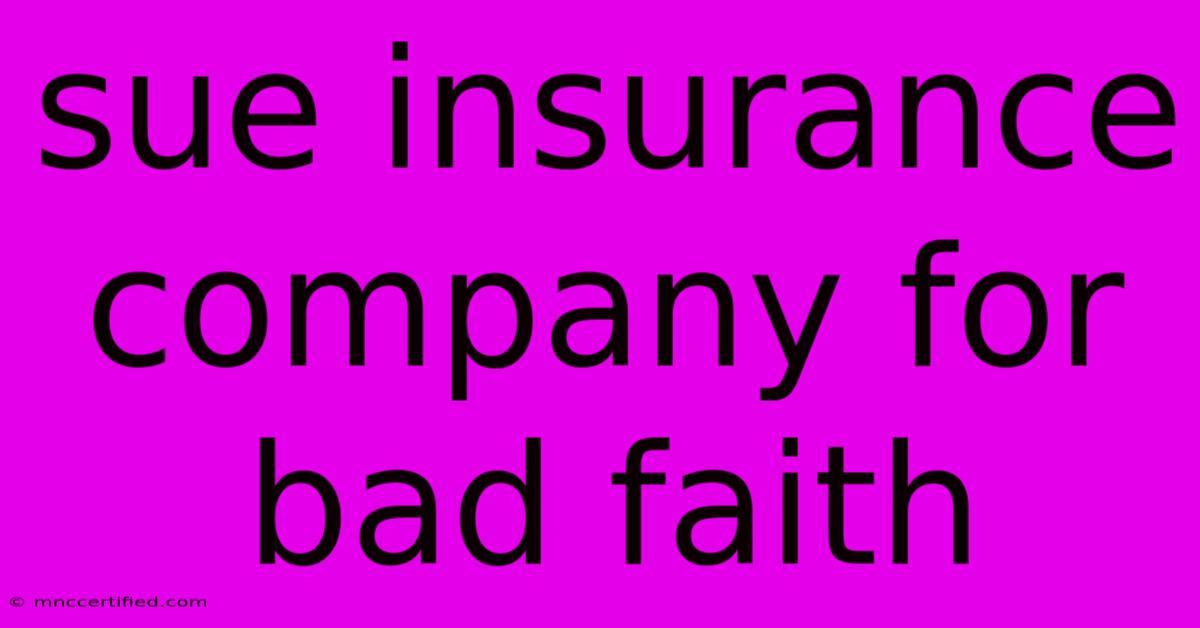Sue Insurance Company For Bad Faith

Table of Contents
Suing Your Insurance Company for Bad Faith: What You Need to Know
Dealing with an insurance company can be frustrating, especially when they seem to be deliberately delaying or denying your legitimate claim. If you feel your insurer has acted in bad faith, you may have grounds to sue them. However, it's crucial to understand the legal complexities and potential risks involved before taking such action.
This article will provide a comprehensive overview of suing an insurance company for bad faith, covering:
- What constitutes bad faith in insurance?
- Common scenarios where bad faith lawsuits are filed.
- The process of filing a bad faith claim.
- Potential outcomes and risks.
- Tips for building a strong case.
What is Bad Faith in Insurance?
Bad faith occurs when an insurance company intentionally acts unfairly or dishonestly to avoid paying a legitimate claim. This can include:
- Denying a claim without proper investigation.
- Delaying the claim process unreasonably.
- Misrepresenting policy terms or coverage.
- Pressuring you to accept a settlement that is far less than the actual value of your claim.
- Failing to communicate with you about your claim in a timely manner.
Common Scenarios for Bad Faith Lawsuits
Here are some common scenarios where bad faith lawsuits are frequently filed:
- Denial of Coverage: An insurance company may deny a claim based on a flimsy reason, like a pre-existing condition, even though the policy clearly covers the event.
- Unreasonable Delay: An insurance company may deliberately stall the claims process, using tactics like demanding excessive documentation or delaying appraisals.
- Lowball Offers: The insurance company may offer a settlement amount significantly lower than the actual cost of your damages, hoping you'll settle for less to avoid litigation.
The Process of Filing a Bad Faith Claim
Filing a bad faith lawsuit involves several steps:
- Consult with an Attorney: An experienced insurance bad faith lawyer can assess your case, understand the laws in your state, and advise you on the best course of action.
- File a Complaint: Your attorney will file a formal complaint with the court, detailing the insurance company's bad faith actions and the damages you've incurred.
- Discovery: Both parties will gather evidence and information through depositions, interrogatories, and document requests.
- Negotiation and Mediation: Your attorney may attempt to negotiate a settlement with the insurance company, or mediation may be used to attempt to resolve the dispute.
- Trial: If negotiations fail, the case will proceed to trial.
Potential Outcomes and Risks
The outcome of a bad faith lawsuit is uncertain. You may receive:
- Payment of your claim: This can include compensation for damages, legal fees, and potentially punitive damages if the insurance company acted intentionally malicious.
- Reformation of your policy: This means the court could modify the policy language to reflect the true intent of the parties.
- An injunction: This is a court order preventing the insurance company from continuing their bad faith practices.
However, you should be aware of the potential risks:
- High legal costs: Litigation can be expensive.
- Uncertainty of the outcome: There's no guarantee you'll win your lawsuit.
- Damage to your relationship with the insurance company: Winning a bad faith lawsuit could make it difficult to get insurance coverage in the future.
Building a Strong Case: Evidence and Tactics
To increase your chances of success, you need to gather substantial evidence proving the insurance company acted in bad faith. This might include:
- Documentation: Copies of your policy, correspondence with the insurance company, claim forms, and any other relevant documents.
- Expert testimony: Experts in your specific field (e.g., medical experts, property damage assessors) can provide evidence of the value of your claim and the insurance company's wrongdoing.
- Witnesses: People who witnessed the insurance company's bad faith conduct can provide valuable testimony.
- Internal Company Documents: Through discovery, you may be able to access internal company records and memos that shed light on their decision-making process.
Conclusion: Know Your Rights and Fight for Fairness
Suing your insurance company for bad faith is a complex legal process that demands careful consideration and expert legal guidance. While it may seem daunting, it's crucial to remember that you have rights as a policyholder and you can fight for fair treatment. By understanding the legal landscape and taking proactive steps to build a strong case, you can increase your chances of success and hold your insurance company accountable for their actions.

Thank you for visiting our website wich cover about Sue Insurance Company For Bad Faith. We hope the information provided has been useful to you. Feel free to contact us if you have any questions or need further assistance. See you next time and dont miss to bookmark.
Featured Posts
-
St Denis Medical Healing Through Humor
Nov 13, 2024
-
Uk Escape 2 5 Hour Trip Christmas Markets Budget Pints
Nov 13, 2024
-
Pistons Outlast Heat In Overtime Battle
Nov 13, 2024
-
Bears Coaching Change Impact On Caleb Williams
Nov 13, 2024
-
Scarlet Tanager Birdwatching Boom In Halifax Yorkshire
Nov 13, 2024